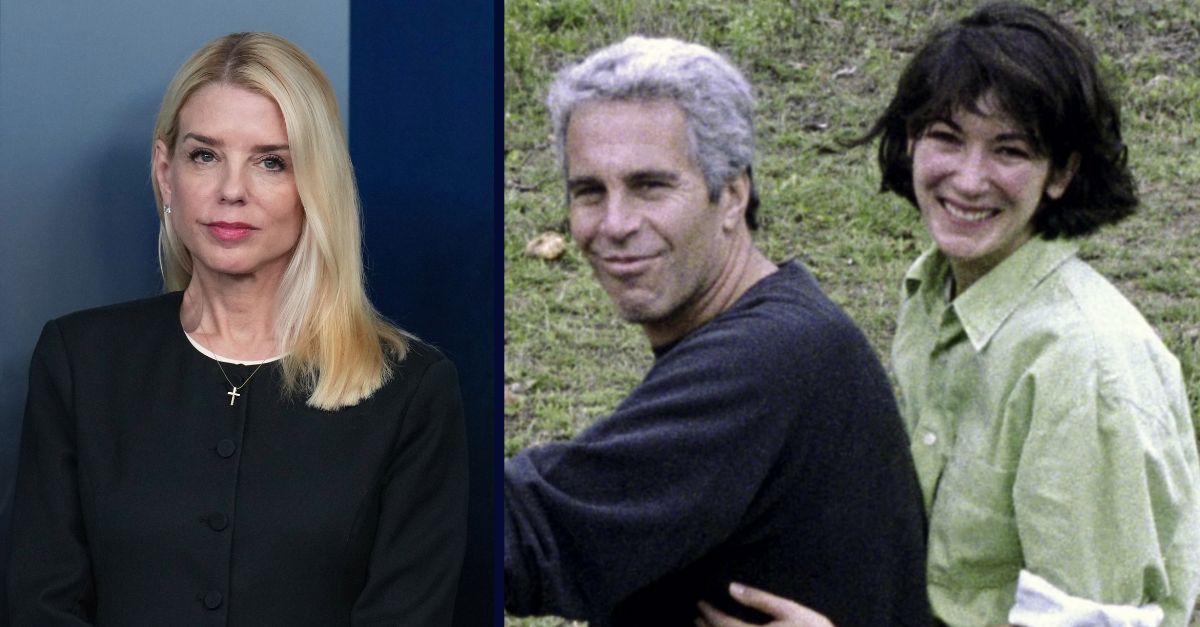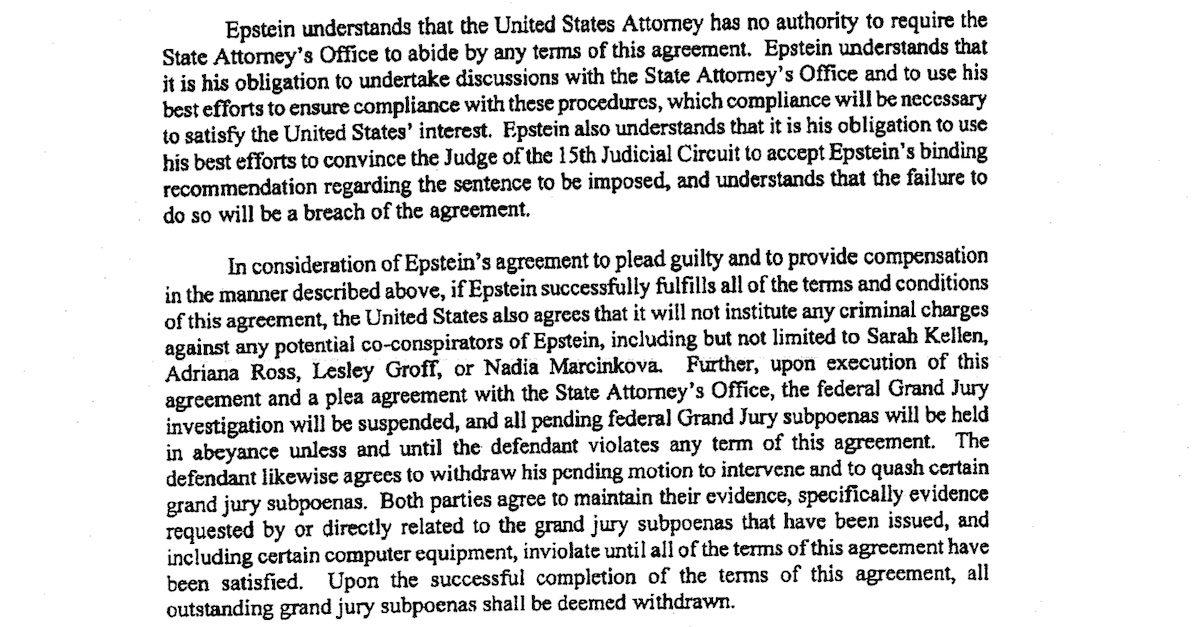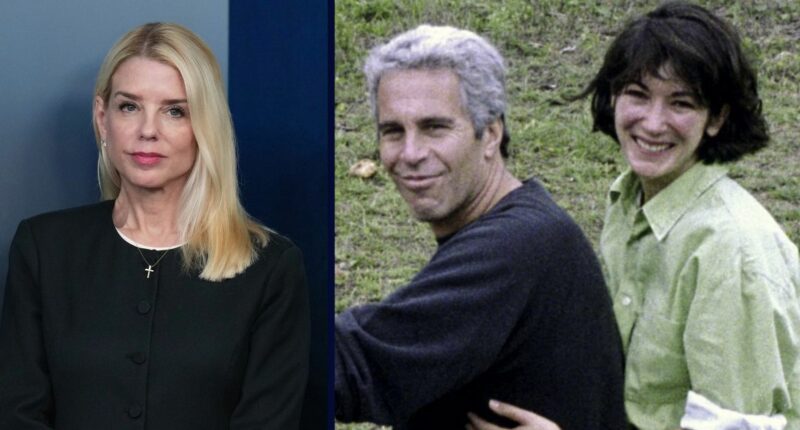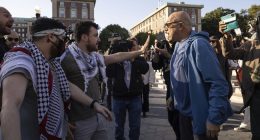
Left: Attorney General Pam Bondi listens as President Donald Trump speaks to the media, Friday, June 27, 2025, in the briefing room of the White House in Washington. (AP Photo/Jacquelyn Martin). Right: A photograph of Jeffrey Epstein and Ghislaine Maxwell found during a 2019 raid on Epstein”s New York townhouse (DOJ).
The U.S. Department of Justice led by Attorney General Pam Bondi placed itself in the awkward position of having to respond Monday to convicted Jeffrey Epstein accomplice Ghislaine Maxwell’s appeal to the Supreme Court after angering President Donald Trump’s base last week with a ham-fisted statement that there is not actually a “client list” linking people to the deceased accused sex trafficker.
While the DOJ, in fact, declined to provide any catnip whatsoever for those who, for years, boosted conspiracy theories about the possible blackmail of powerful figures and Epstein’s 2019 death by suicide in jail before he could face trial, the government did meet the July 14 deadline to oppose Maxwell’s bid to undo her convictions.
In May and June, the DOJ separately requested — and received — extensions for its response to Maxwell’s petition for a writ of certiorari. Those extensions delayed action in the case until Monday.
According to the DOJ, Maxwell doesn’t have a leg to stand on when she claims the government wrongly disregarded the terms of an infamous Epstein non-prosecution agreement (NPA), so her 20-year sentence for enticing young girls and grooming the victims for sex trafficking and abuse at the hands of her former boyfriend should remain in place.
“Petitioner renews her contention that Epstein’s nonprosecution agreement with the U.S. Attorney for the Southern District of Florida barred petitioner’s prosecution by the U.S. Attorney for the Southern District of New York. That contention is incorrect, and petitioner does not show that it would succeed in any court of appeals,” the DOJ said. “This case would also be an unsuitable vehicle for addressing the matters raised in the petition for a writ of certiorari.”
The DOJ stated that the 2007 NPA was reached with the U.S. Attorney’s Office for the Southern District of Florida only, and that it did not bar U.S. attorneys in other jurisdictions from bringing prosecutions.
“[E]ven if the Florida USAO had purported to bind all other USAOs in the NPA, it would have lacked authority to do so. Under DOJ policy at the time the Epstein NPA was entered, a USAO could bind other districts in an NPA only if it obtained the approval of those districts or the Criminal Division,” the DOJ continued. “The USAO here did not do so. And petitioner cannot make up for the absence of actual authority by invoking principles of estoppel or apparent authority against the government.”
“That is particularly true where she is, at most, an incidental third-party beneficiary of the agreement,” the government concluded of Maxwell.
The actual NPA, DOJ emphasized, was cut while the “government was not even aware of petitioner [Maxwell]’s role in Epstein’s scheme at that time” — and unlike others in Epstein’s orbit, Maxwell’s name did not appear in the agreement.

Portion of Jeffrey Epstein non-prosecution agreement, including for potential co-conspirators (DOJ).
Maxwell’s petition, on the other hand, insisted that she “never should have been charged” and that there was a split among the federal appellate courts that needed resolving. Her attorney David Oscar Markus called the case an “ideal vehicle” to make that happen.
“Under Santobello and common principles of contract interpretation, does a promise on behalf of the ‘United States’ or the ‘Government’ that is made by a United States Attorney in one district bind federal prosecutors in other districts?” Maxwell’s petition said in April, citing a Supreme Court case from 1971 on the government’s plea agreement and sentencing recommendation reversal in a gambling case.
Maxwell, a 63-year-old fallen British socialite who once boasted ties to the Clintons and Prince Andrew, is currently incarcerated in Tallahassee’s federal lockup. She has asked the justices to find that, like in the Santobello case, the government made a promise it should have kept and that the judgment of her conviction should be vacated as a result.
“This case is especially worthy of review because it cleanly presents the issue at hand, which is ripe for this Court’s attention. In this case, the government made a written promise that Epstein’s co-conspirators would not be prosecuted by the United States, and Maxwell was in fact prosecuted as a co-conspirator of Epstein by the United States,” said Maxwell’s brief. “The only question is whether the government’s promise that the ‘United States’ would not prosecute her was enforceable against the U.S. Attorney’s office in New York, or only against the Southern District of Florida.”
Last September, the 2nd U.S. Circuit Court of Appeals concluded that the NPA did not protect Maxwell in New York, where she was tried, convicted, and sentenced. The much-discussed so-called sweetheart plea deal Epstein reached in 2007 included an NPA for “potential co-conspirators” as Epstein agreed to admit to state charges of soliciting prostitution from a minor and served time in a local jail instead of, at that time, facing a major federal case.
In the earlier stages of her criminal case, Maxwell raised the NPA immunity argument without success. In June 2022, more than a year later, U.S. District Judge Alison Nathan sentenced Maxwell to prison. But Maxwell repeated the NPA argument again in her March 2023 appeal, claiming that the government caved to “public outrage over an unpopular non-prosecution agreement” and was punishing her instead of the “person responsible for the crimes,” Epstein, who died by suicide in jail as he awaited trial in 2019.
“In its zeal to pin the blame for its own incompetence and for Epstein’s crimes on Maxwell, the Government breached its promise not to prosecute Maxwell, charged her with time-barred offenses, resurrected and recast decades-old allegations for conduct previously ascribed to Epstein and other named assistants, and joined forces with complainants’ civil attorneys, whose interests were financial, to develop new allegations that would support charges against Maxwell,” Maxwell asserted on appeal.
The 2nd Circuit, however, found “no errors in the District Court’s conduct of this complex case” — whether by denying Maxwell a new trial after a juror’s “erroneous” answer to a question on if he was a sexual abuse victim, whether by rejecting her statute of limitations arguments, or whether by deciding without an evidentiary hearing that the more than a decade old NPA wasn’t binding.
Love true crime? Sign up for our newsletter, The Law&Crime Docket, to get the latest real-life crime stories delivered right to your inbox.
The appellate panel ruled it was “well established” in the 2nd Circuit that a plea agreement “binds only the office of the United States Attorney for the district in which the plea is entered unless it affirmatively appears that the agreement contemplates a broader restriction,'” and there was “nothing” in the Epstein deal that “affirmatively shows that the NPA was intended to bind multiple districts[.]”
The revelations about the Epstein plea deal led to the resignation of Alexander Acosta in 2019, who served as U.S. Department of Labor secretary during Trump’s first term as president. Acosta was the U.S. Attorney for the Southern District of Florida who signed off on the NPA, the existence of which was illegally concealed from Epstein’s victims, a federal judge ruled in 2019.
Days before he resigned, Acosta was memorably asked if it was true that Epstein was an “intelligence asset,” which Acosta reportedly suggested might have been the case in response to Trump transition team questioners ahead of his confirmation hearings.
“So, there has been reporting to the effect. And let me say, there’s been reporting to a lot of effects in this case — not just now but over the years,” Acosta said. “And again, I would hesitate to take this reporting as fact. This was a case that was brought by our office, it was brought based on the facts. And I look at that reporting and others — I can’t address it directly because of our guidelines — but I can tell you that a lot of reporting is just going down rabbit holes.”
After failing to deliver the “Epstein files” goods that she suggested would be coming in February, Bondi was pressed last week about “lingering” Epstein “mysteries,” like the question of whether his original federal case was scuttled because he was an “intelligence asset.”
“I have no knowledge about that. We can get back to you on that,” Bondi answered.
Before Bondi responded, Trump interrupted to question the public’s — and, by extension, his own supporters’ — interest in Epstein, whom Trump partied with at Mar-a-Lago in the 1990s.
More Law&Crime coverage: Ghislaine Maxwell’s accuser ‘Jane’ testifies that Jeffrey Epstein introduced her to Trump at Mar-a-Lago when she was 14
“Are you still talking about Jeffrey Epstein? This guy’s been talked about for years,” he said. “Are people still talking about this guy? This creep? That is unbelievable.”
In a 2002 interview, Trump called Epstein a “terrific guy” he had known for 15 years, while noting Epstein’s interest in “beautiful women” on the “younger side.”
“He’s a lot of fun to be with,” Trump told New York magazine. “It is even said that he likes beautiful women as much as I do, and many of them are on the younger side. No doubt about it – Jeffrey enjoys his social life.”
By 2019, and in the course of defending Acosta, Trump had changed his tune on Epstein, saying he “knew him like everybody in Palm Beach knew him.”
“I had a falling out with him a long time ago,” Trump said. “I don’t think I’ve spoken to him for 15 years. I wasn’t a fan.”
As for Maxwell, Trump in 2020 wished her well following her arrest, stoking the “Epstein didn’t kill himself” conspiracy theory and meme in the process.
“Her friend or boyfriend was either killed or committed suicide in jail,” Trump said of Maxwell and Epstein. “She’s now in jail. Yeah, I wish her well. I’d wish you well. I’d wish a lot of people well. Good luck. Let them prove somebody was guilty.”
Months before his 2024 election win, Trump sat down for an interview on X with podcaster Lex Fridman. When asked about an “Epstein list” of clients, a list which his own DOJ now says does not exist, Trump indicated it “probably will be” made public on his watch — or at least, he’d “certainly take a look at it.”
Trump stated that, unlike “a lot of people,” he’d “fortunately” never been to Jeffrey Epstein’s island, dubbed “Pedophile Island.”
“I’m not involved, I never went to his island,” he said.
Trump had months earlier told Fox News, “Yeah, yeah, I would. I guess I would,” when asked if he would declassify the “Epstein files” — and as a result of the foregoing, many of his most hardcore supporters believed that a reckoning was coming.
Trump did add a caveat on Epstein disclosures, however.
“I think that less so because you don’t know — you don’t want to affect people’s lives if it’s phony stuff in there, because there’s a lot of phony stuff with that whole world,” Trump said.
The interviews show, at a minimum, Trump was aware that many people, including his own supporters, cared a great deal about providing the public with more answers about the Epstein saga. Yet, in the aftermath of the MAGA backlash over Bondi’s handling of the “Epstein files,” Trump over the weekend on Truth Social blamed Democrats for his administration’s review and directly questioned why his “‘boys’ and, in some cases, ‘gals'” were calling for his AG’s ouster.
“For years, it’s Epstein, over and over again. Why are we giving publicity to Files written by Obama, Crooked Hillary, Comey, Brennan, and the Losers and Criminals of the Biden Administration, who conned the World with the Russia, Russia, Russia Hoax, 51 ‘Intelligence’ Agents, ‘THE LAPTOP FROM HELL,’ and more? They created the Epstein Files, just like they created the FAKE Hillary Clinton/Christopher Steele Dossier that they used on me, and now my so-called ‘friends’ are playing right into their hands,” he wrote in part.







